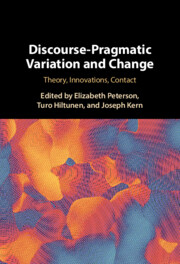Book contents
- Discourse-Pragmatic Variation and Change
- Discourse-Pragmatic Variation and Change
- Copyright page
- Contents
- Figures
- Tables
- Contributors
- Foreword
- Acknowledgments
- Abbreviations
- Introduction
- Part I Innovations in Theory and Method
- 1 Reflexes of Abruptness in the Development of Pragmatic Markers
- 2 Evaluation of Pragmatic Markers
- 3 Quotative Variation and Change in French with Additional Insights from Brazilian Portuguese and Italian
- 4 Cross-Linguistic Variation in Spoken Discourse Markers
- Part II Innovative Variables in English
- Part III Language Contact Settings
- Afterword
- References
- Index
3 - Quotative Variation and Change in French with Additional Insights from Brazilian Portuguese and Italian
from Part I - Innovations in Theory and Method
Published online by Cambridge University Press: 14 July 2022
- Discourse-Pragmatic Variation and Change
- Discourse-Pragmatic Variation and Change
- Copyright page
- Contents
- Figures
- Tables
- Contributors
- Foreword
- Acknowledgments
- Abbreviations
- Introduction
- Part I Innovations in Theory and Method
- 1 Reflexes of Abruptness in the Development of Pragmatic Markers
- 2 Evaluation of Pragmatic Markers
- 3 Quotative Variation and Change in French with Additional Insights from Brazilian Portuguese and Italian
- 4 Cross-Linguistic Variation in Spoken Discourse Markers
- Part II Innovative Variables in English
- Part III Language Contact Settings
- Afterword
- References
- Index
Summary
The quotative system is routinely adduced as the locus of rapid cross–linguistic change. Aside from the prodigious number of empirical studies investigating English quotatives, quantitatively driven demonstrations of change in the quotative system of other languages remain the exception to the rule. Observing that change in languages other than English has often been intuited from isolated or anecdotal examples, we inaugurated a large–scale study of quotative variation in European and Canadian varieties of French, supplemented by data from Brazilian Portuguese and Italian. Drawing on more than 5,500 tokens representing the targeted varieties, detailed quantitative investigation revealed that only in urban varieties of Quebec and Acadian French does the innovative être comme variant (cf. English be like) qualify as a mid–range – and locally conditioned – change in progress. In other varieties that we examined, including the French and Portuguese spoken in the global cities of Paris and São Paulo respectively, we find little compelling evidence of anything other than relatively incipient change in the quotative system. Taken together, our quantitative results are damaging to ubiquitous claims that simultaneous parallel developments are purportedly affecting the quotative system of numerous languages and point to the primordial importance of community–based speech data in ratifying linguistic change.
- Type
- Chapter
- Information
- Discourse-Pragmatic Variation and ChangeTheory, Innovations, Contact, pp. 61 - 82Publisher: Cambridge University PressPrint publication year: 2022

